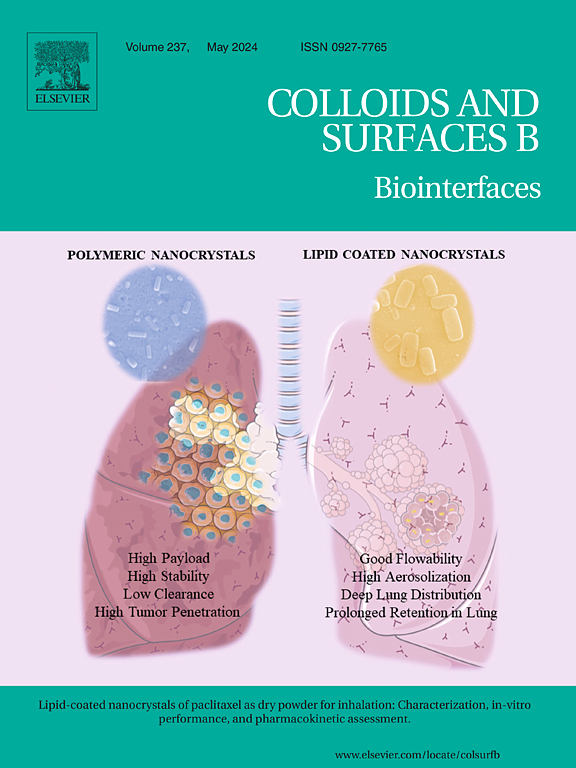Folic acid-based hydrogels co-assembled with protocatechuic acid for enhanced treatment of inflammatory bowel disease
IF 5.4
2区 医学
Q1 BIOPHYSICS
引用次数: 0
Abstract
Inflammatory bowel disease (IBD) presents a significant therapeutic challenge due to the need for oral drug delivery systems that withstand acidic environment of stomach while effectively targeting intestinal inflammation. To address this issue, we created a novel hydrogel system based on a folic acid (FA)-dopamine (DA) conjugate, co-assembled with protocatechuic acid (PCA), to form F-DP hydrogels. These hydrogels demonstrated robust anti-gastric acid, mucosal adhesive, and injectable properties, enhancing their efficacy for targeted delivery. In DSS-induced colitis mouse models, treatment with F-DP hydrogels resulted in significant therapeutic improvements, including increased body weight, reduced disease activity index (DAI), and maintained colon length. Biochemical assays revealed that F-DP hydrogels significantly enhanced antioxidant enzyme activities (GSH and SOD) and reduced oxidative stress markers (NO and MDA). Histological assessments confirmed effective repair of the colonic mucosal barrier, restoration of tight junction protein ZO-1, and reduction of inflammatory lesions. Furthermore, immunofluorescence staining indicated that F-DP hydrogels facilitated macrophages polarization from the pro-inflammatory M1 phenotype to the anti-inflammatory M2 phenotype, thereby reducing inflammation and promoting tissue repair. Our study demonstrates that F-DP hydrogels show significant potential for improving IBD treatment through enhanced gastric resistance, intestinal adhesion, and synergistic anti-inflammatory effects, warranting further investigation for clinical applications.
叶酸基水凝胶与原儿茶酸共同组装,用于加强对炎症性肠病的治疗。
炎症性肠病(IBD)给治疗带来了巨大挑战,因为需要既能承受胃酸环境又能有效针对肠道炎症的口服给药系统。为解决这一问题,我们创建了一种新型水凝胶系统,该系统基于叶酸(FA)-多巴胺(DA)共轭物,与原儿茶酸(PCA)共同组装形成 F-DP 水凝胶。这些水凝胶具有很强的抗胃酸、粘膜粘附性和可注射性,从而提高了其靶向递送的功效。在 DSS 诱导的结肠炎小鼠模型中,使用 F-DP 水凝胶治疗可显著改善治疗效果,包括增加体重、降低疾病活动指数(DAI)和保持结肠长度。生化分析表明,F-DP 水凝胶显著提高了抗氧化酶活性(GSH 和 SOD),降低了氧化应激指标(NO 和 MDA)。组织学评估证实了结肠粘膜屏障的有效修复、紧密连接蛋白 ZO-1 的恢复以及炎症病变的减少。此外,免疫荧光染色表明,F-DP 水凝胶可促进巨噬细胞从促炎的 M1 表型极化为抗炎的 M2 表型,从而减轻炎症并促进组织修复。我们的研究表明,F-DP 水凝胶通过增强胃抵抗力、肠粘附力和协同抗炎作用,在改善 IBD 治疗方面显示出巨大的潜力,值得进一步研究其临床应用。
本文章由计算机程序翻译,如有差异,请以英文原文为准。
求助全文
约1分钟内获得全文
求助全文
来源期刊

Colloids and Surfaces B: Biointerfaces
生物-材料科学:生物材料
CiteScore
11.10
自引率
3.40%
发文量
730
审稿时长
42 days
期刊介绍:
Colloids and Surfaces B: Biointerfaces is an international journal devoted to fundamental and applied research on colloid and interfacial phenomena in relation to systems of biological origin, having particular relevance to the medical, pharmaceutical, biotechnological, food and cosmetic fields.
Submissions that: (1) deal solely with biological phenomena and do not describe the physico-chemical or colloid-chemical background and/or mechanism of the phenomena, and (2) deal solely with colloid/interfacial phenomena and do not have appropriate biological content or relevance, are outside the scope of the journal and will not be considered for publication.
The journal publishes regular research papers, reviews, short communications and invited perspective articles, called BioInterface Perspectives. The BioInterface Perspective provide researchers the opportunity to review their own work, as well as provide insight into the work of others that inspired and influenced the author. Regular articles should have a maximum total length of 6,000 words. In addition, a (combined) maximum of 8 normal-sized figures and/or tables is allowed (so for instance 3 tables and 5 figures). For multiple-panel figures each set of two panels equates to one figure. Short communications should not exceed half of the above. It is required to give on the article cover page a short statistical summary of the article listing the total number of words and tables/figures.
 求助内容:
求助内容: 应助结果提醒方式:
应助结果提醒方式:


